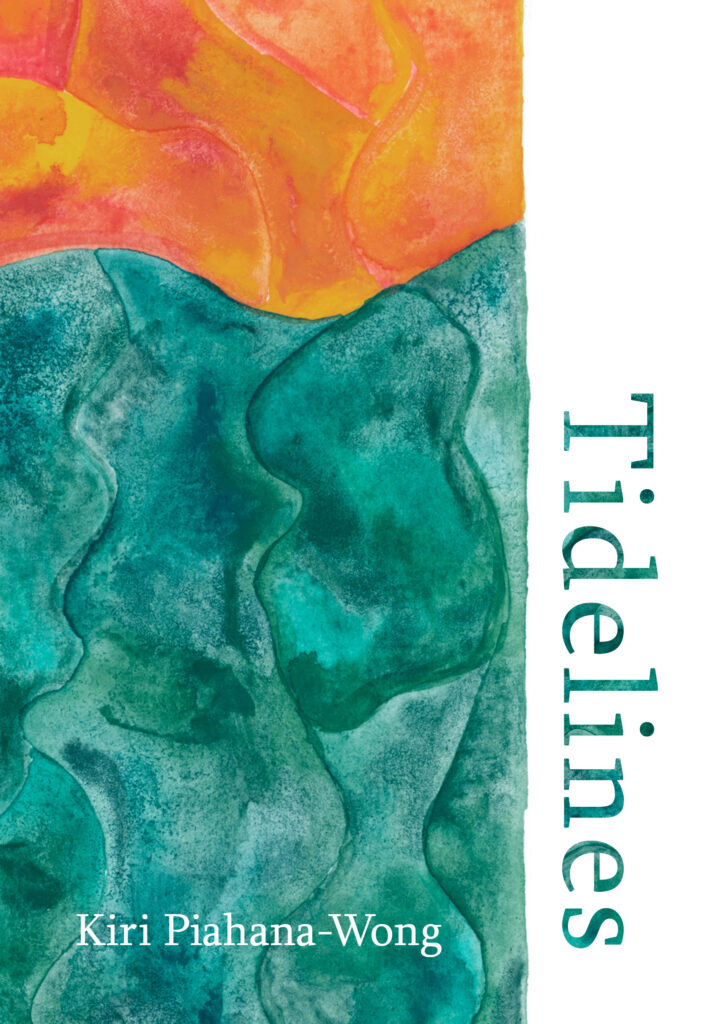Tidelines is set on Auckland’s west coast, so the poems are encrusted with salt. If the collection has a colour, it’s the grey, windswept, hard-shelled melancholia of small, coastal towns: gulls, storms, a clothesline, flax, pōhutukawa, cars. The collection is bookended by the purakau of Hinerangi – a woman who lived in Karekare long ago, and waited on a cliff to die after her husband was swept away at sea. These poems are narrated as if by Hinerangi herself. In between lies Kiri Piahana-Wong’s own grief and depression, and she writes about the flood and ebb of these hard feelings with equanimity and grace.
Piahana-Wong, who is of Ngāti Ranginui, Chinese and Pākehā ancestry, was born in Taumarunui, and currently lives in Whanganui – but she spent most of her life living by the sea, (Auckland’s North Shore, Laingholm) and this shows in her writing. A tideline is a line left or reached by the sea on a shore at the highest point of a tide. So perhaps the tidelines here are the capacity to withstand – Hinerangi and Piahana-Wong’s limits – but tides necessarily rise and fall within its parameters, and these poems sit bobbing, stoically, with that instability. Tides are essentially long-period waves, and so it is a beautiful analogy for mental unwellness, which too comes in and goes out, is regular and responsive.
The poems ride out into the world beyond, and deep into the soul, but they are also grounded in ordinariness – routine, daily living.
… the king tides pacing the shoreline, and then
the horizon-line, over and over and over – all of it
was too much drama, and far too much poetry, like
living in a landscape of ancient Atua come to life again.
I needed to be less in awe all day. I wanted to put my
feet up and watch television.
The language throughout is evocative and rhythmic, against a base that is clean and definitive – precise – like waves scalloping the shoreline. In ‘So far below’, Piahana-Wong catapults immense distances – from someone’s arms, to being alone in bed, to space (‘Far above, the stars wheel / And the weight of the moon / presses’) – in the space of a few lines.
In the opening poem, Hinerangi, who is grieving for her husband, is sick of being alive and longs to be part of the world (through death):
I longed to merge my voice
with the world-song, become
a single drop in the ocean,
be everywhere and nowhere.
This kind of letting go of the self is seen in Piahana-Wong’s own narrative, and the writing of the book seems to be a way of reaching towards, and merging with, the world. The book is also a manifestation of her grief and depression, and that it is short – only 40 pages long – seems appropriate to me: she has no energy for pomp. There are no filler poems; everything is just so. Piahana-Wong is confidently serving the purpose of poetry, rather than trying to satisfy conventional publishing norms.
The contemporaneous recrudescence of both of the narrators’ pain made me think of Te Whare Tapu Wha, where taha hinengaro, or mental health, is seen as the combination of thoughts, feelings and emotions, and the capacity to think, feel and communicate – and how these are inseparable. The understanding of taha hinengaro comes from thinking wider and searching outwards, into the community and the world (conversely, Western ways of thinking break it into smaller parts, i.e therapy).
By telling the story of at least two other wāhine Māori (another tūpuna, Kahukeke, is mentioned, as well as a friend named Sophia), Piahana-Wong connects herself to a larger narrative, and now she is not alone. In ‘On the day I died’, she is saved off of the same cliff that Hinerangi died on, by her tūpuna, as Hinerangi calls to her, urging her to jump into the sea, to join her on the other side.
And with their coming, a mighty
gust of wind blew me back
from the edge of the cliff
and away, until the forest
swallowed it from sight.
This is Piahana-Wong’s second book – her first collection of poetry was Night Swimming, published in 2013. She actively publishes in journals and anthologies here and abroad; she co-edited Te Awa o Kupu (Penguin Random House, 2023), an anthology of contemporary Māori poetry and fiction; and she is the founder of Anahera Press, the publisher of this book and of work by Simona Kaho, Serie Barford and Apirana Taylor, among others.
My favourite poem in the collection is simply titled ‘Happiness’, and it begins by wondering what it means to be happy. With slight detachment, she breaks it down (‘Why then, does it feel / so sad?); and then she is encased in ice, waiting. Then she pops a Lorazepam and seems to be stress-free, but:
It’s temporary.
Eventually the worry birds
return, re-spool their
steel wires around my head,
build their nest, roost.
I lie in bed,
Scrunching up my forehead.
I feel hungover.
I have recalibrated.
Timing is crucial for one’s experience of art. When something arrives at an awkward time, its full force and intent can’t be felt. But when it arrives at a time that makes sense, it can make you believe in the alignment of stars, of the universe sending signs, of things being possible again.
I picture this book as a big rock in the ocean, slowly, very slowly becoming softened by the water. We’re not told who Piahana-Wong is grieving for, and her mental states are never explained. Instead, she seems to be writing with understanding and acceptance, meditating. Even in the darkest moments, there is curiosity and hope. There is power in owning your feelings and your history.



